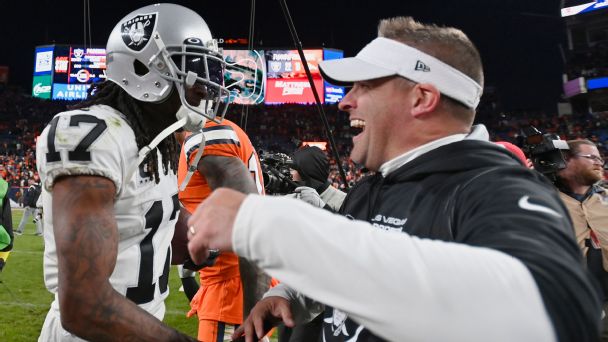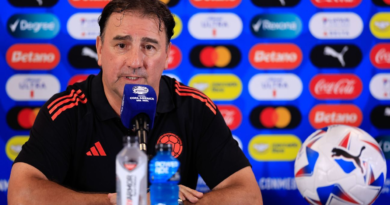Inside Justin Fields' journey with epilepsy
LAKE FOREST, Ill. — Justin Fields regained consciousness in the back of the ambulance with no recollection of what had happened. All he remembered from that morning in ninth grade was feeling “a little bit off” as he headed to Harrison High School in Kennesaw, Georgia.
Sitting in health class, Fields said he zoned out a handful of times. He would later learn he had a seizure and lost consciousness.
The 23-year-old Chicago Bears quarterback, who was 15 at the time, was diagnosed with epilepsy, which is the fourth-most common neurological disorder in the world, according to the Epilepsy Foundation.
“I was crying, because I didn’t know how that would affect my football career,” Fields recently told ESPN.
As it turned out, it hasn’t affected it at all. Fields, in just his second season, is emerging as one of the most prolific rushing quarterbacks in the NFL and leads all QBs with 834 rushing yards this season, despite missing Sunday’s game after suffering a separated left shoulder. After a tough rookie season, Fields was beginning to live up to his hype before the shoulder injury, including rushing for 178 yards — the most by a QB in a regular-season game in the Super Bowl era — against the Miami Dolphins in Week 9. He’s considered day-to-day leading up to Sunday’s game against the Green Bay Packers (1 p.m. ET, Fox) in Chicago.
The Bears traded up nine spots to select Fields No. 11 overall in the 2021 draft, and former Bears GM Ryan Pace, who was fired after a 6-11 finish last season, said Chicago was comfortable drafting Fields because of how he handled his condition.
As November, which is National Epilepsy Awareness Month, comes to an end, Fields opened up about his journey, from that day in the ninth grade, to understanding the warning signs to the preventative measures he takes every day to the potential of outgrowing the condition. There was a time he said he wasn’t comfortable talking about epilepsy, but now he wants to help raise awareness and be a role model for others.
“I THINK THEY tried to get all the kids out of the class when I was having it,” Fields said of his first seizure. “They said I was foaming at the mouth and stuff like that.”
After a round of testing, including a CT scan and electroencephalogram, where electrodes were placed onto Fields’ scalp to record the electrical activity of his brain, doctors determined he had epilepsy.
They drew a hereditary connection upon learning Fields’ mother, Gina Tobey, also had epilepsy. Tobey was diagnosed in the seventh grade, and she said she outgrew the condition around the age of 19.
“Absolutely you can outgrow it,” said Jacqueline French, the chief medical officer of the Epilepsy Foundation and professor of neurology at NYU Grossman School of Medicine. “There are some types of epilepsy that you outgrow, and there are others that you don’t.”
Tobey said doctors believe puberty triggered the onset of her epilepsy, and she believes that might have been the same situation for Fields. French said puberty can trigger epilepsy due to the impact hormones can have on a person’s seizure threshold.
Tobey shared her journey with Fields and pointed out warning signs of an oncoming seizure. The most important advice she gave him was to remain diligent about taking his medication. Fields takes four pills every morning to prevent seizures.
He said the seizures have occurred about a year and a half apart, and he estimates his last one was a couple of years ago, before the draft.
“When I did have them, it was just because I didn’t take my medicine,” Fields said. “There was one time I had one, I wanted to see if I grew out of it, because my mom grew out of it. So let me see if I did, too. But I don’t even play with it now.”
Tobey saw a difference in her son’s experience.
“What I noticed that was different from me was his recovery time,” she said. “When you have a seizure, it’s like shaking something in a cup. Your brain is like bouncing all around in your head.
“At the end of the episode, you have these monster migraines, and for me, it would take me one or two days to recover. For him, it takes him two to three hours, he can sleep it off.”
FIELDS IS WELL-VERSED in how to handle the onset of a possible seizure.
“I know when I have one coming, I just forget what I’m doing, zone out and then boom, 30 seconds later be locked in, and then I’ll do it two or three times,” he said. “So once I do it two or three times, then I know something’s coming.”
He immediately lays down and tries to rest when he thinks a seizure is coming.
“The last one I had I felt it right away, so I went to lay down and I still had it,” he said. “I went to sleep. I guess I had it in my sleep, then I woke up and my head was hurting.
“So when I wake up and my head’s hurting, I know I had a seizure. My body’s sore. When you have a seizure, usually all your muscles flex up … you’ve been flexing your muscles for 45 seconds or a minute. So I know when I’m about to have one now, I usually just try to lay down and go to sleep.”
Fields can sympathize with how his parents felt, including his father Pablo, who was a resource officer at Harrison High School and is a retired Atlanta police officer.
“I think any time when you see your kid on the floor having a seizure, you can’t do anything about it. You just got to wait until he wakes up,” Fields said. “It’s probably really scary for them. I know my dad; he hates seeing them.
“He has always been so adamant on me taking my medicine and making sure I’m not staying up too late and getting enough sleep. He always used to tell me that he loves when I’m sleeping. Every time I’m sleeping, he won’t tell me to do anything because of course he knows sleep will help with that.”
It’s possible Fields outgrows his seizures, but for the time being, Tobey isn’t taking any chances.
“He’s 23, but I’m still always going to say ‘Are you taking your medicine?”’ she said. “Just because that’s what mothers do when it comes to everything.”
FIELDS SAID HE never missed a game because of epilepsy — from high school through college at Georgia and Ohio State and into the NFL.
“That’s what my first fear was,” Fields said. “When I was first diagnosed, I was like, ‘Dang, football is like — I’m getting hit in the head all the time. I don’t even know if I’ll be able to play for a long time.’ But I don’t think it was a big conversation with the neurologist.”
French said doctors usually advise caution when it comes to playing contact sports with epilepsy, but there are no absolutes that rule out someone’s ability to play football. The key, French said, is to make sure the condition is being properly controlled.
“If it’s not controlled, then there is the possibility that somebody may have an altered awareness intermittently, and if you were playing a sport where that could put you in danger in and of itself, then that would be an issue that would have to be seriously discussed,” French said.
She added: “We don’t want to put people with epilepsy in a glass box. Every conversation that we have with them is: What is the benefit? What does this mean to you? And what is the risk? But at the end of the day, if you’re of age, you get to make a decision about what you do.”
Three team sources present in draft meetings, one from the NFC and two from the AFC, told ESPN that Fields’ epilepsy arose in conversations as they evaluated him as a draft prospect, but it was not considered a reason not to draft him because of how well he managed the condition.
“[Fields has] handled a lot of those things throughout his life, and we have a lot of ties into the Ohio State football program, and our doctors and trainers do a great job,” Pace said on the night he drafted Fields. “We were very comfortable with that and how he handles that.”
Fields said he doesn’t remember having specific conversations about his epilepsy during any of his pre-draft visits with teams. His agent, David Mulugheta of Athletes First, prepared him for any possible questions.
“I mean, it’s crazy, but at the end of the day, it’s a business, so it is what it is,” Fields said.
When Fields’ epilepsy became public before the draft, Ohio State coach Ryan Day took to Twitter to support his quarterback, who was the first one in OSU history to lead the Buckeyes to back-to-back playoffs. Fields finished third in the Heisman voting as a sophomore.
“Justin’s health, toughness and work ethic have never been an issue, and I am incredibly proud of his professionalism and the character he displays on and off the field,” Day tweeted. “The fact that he never missed a game at Ohio State speaks volumes about how he takes care of himself.”
Fields isn’t the first person with epilepsy to play in the NFL. Former Pittsburgh Steelers guard Alan Faneca discussed his experience with epilepsy during his Hall of Fame induction speech in August 2021.
“If I did it, so can Justin Fields, and so can anyone else,” Faneca tweeted after news broke of Fields’ epilepsy. “It is part of us, but does not define us!”
French praised Fields for sharing his journey and using his platform to help raise awareness. Like Faneca, Fields is focused on breaking stigmas and inspiring others, especially children with epilepsy.
“It’s just that, bringing more awareness and then also giving those kids hope,” Fields said.
ESPN NFL Insider Jeremy Fowler contributed to this report.




